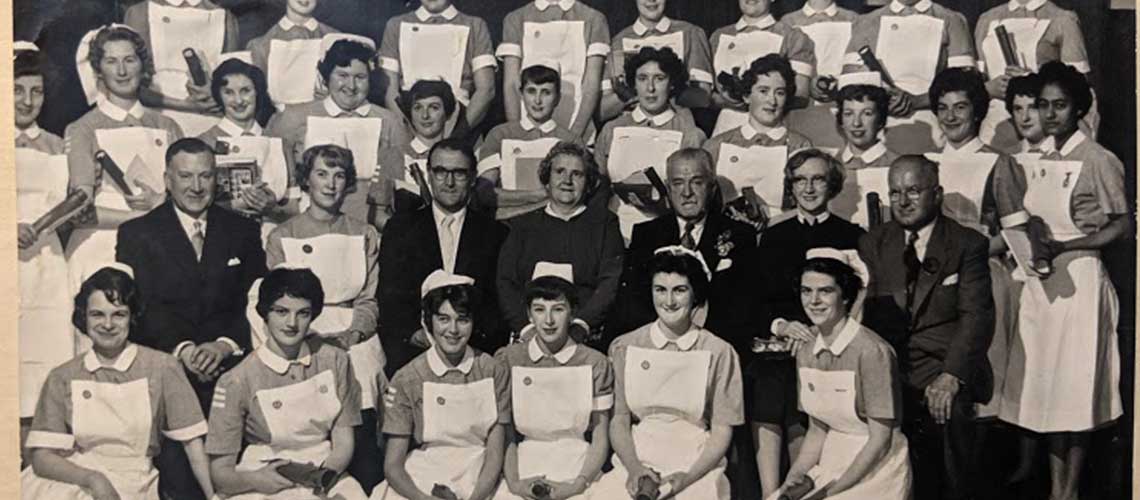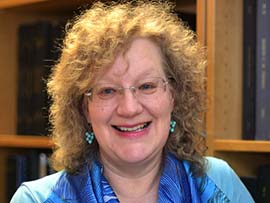Capturing the stories of the NHS
On 5 July 1948 history was made as the National Health Service was introduced in the United Kingdom. It was the first time in history that completely free healthcare was made available on the basis of citizenship, and 76 years later we are more grateful than ever to have it.

Over the years, the NHS has faced some huge challenges and saved countless lives.
In an attempt to document all of this, The University of Manchester’s Stephanie Snow created the NHS at 70 project with the aim of collecting NHS stories from patients, staff and families to create a digital archive of the service’s long and illustrious history.
Stephanie, whose background is in the history of healthcare, decided to set this project up in 2017 after becoming frustrated that there wasn’t an openly accessible place that reflected what the NHS was all about.
Stephanie said: “My main field of research since around 2007 has been focussed on contemporary history, particularly the history of the NHS.”
“Within this body of work, I started to realise that the sources we were using, in terms of documents and oral history, didn’t really reflect what the NHS was in terms of the fact that since 1948 it’s been absolutely central to everyday life and work across the UK.”
“It got me thinking that we haven’t really got a proper historical record of the NHS, so I submitted an application to the National Lottery Heritage fund to create a history of the NHS.”

Dr Stephanie Snow
Stephanie snow is a historian of medicine and healthcare based in the University’s Centre for the History of Science, Technology and Medicine.
Covering all bases
Part of the application detailed how volunteers would need to be recruited and trained in oral history methods in order to go out and conduct interviews with patients, staff and the general public.
So far, over 170 people have volunteered and been trained and more than 2,400 recordings have been banked. Voices that have never been heard before are now on historical record, something that Stephanie was always keen to ensure.
“This isn’t just about the doctors, nurses and surgeons, who obviously do a fantastic job. But it’s about everyone involved in the NHS like the porters, the lab technicians and the catering staff,” Stephanie explained.
“Finding these people to interview hasn’t been as challenging as we thought thanks to our amazing volunteers. We actually have a lot of ex-NHS staff who volunteer, and who have a huge network of ex-colleagues to call upon. We also have local and national partners, such as the Stroke Association and Age UK, who are incredibly supportive in this respect.”
“Now, their voices will go into the first digital archive to ever document the history of the NHS for people to use for research, education, heritage and so on.”

Through the years
The stories that have been gathered go all the way back to times that pre-date the inception of the NHS, with one interviewee talking about her experiences of campaigning on the streets in favour of a national health service, right up to stories about the coronavirus pandemic.
The diverse range of interviewees is also clear to see, with different ethnic groups, age groups and religions all represented within the archive.
“Our youngest interviewee is 18 and our oldest is 105,” Stephanie explained.
“We have such a wide array of stories. One that always stays in my mind is someone who spoke about what healthcare was like before the NHS. She mentions an occasion where she was having her tonsils removed and the GP came to the house to do it and she remembers her mother scrubbing the kitchen table because that’s where she was going to have the operation!”
“Then, on the flip side, we have a lot of teenagers talking about their experiences of receiving mental health support via the NHS in modern times.”
COVID-19
The onset of the pandemic and social distancing rules from March 2020 made it more difficult to conduct interviews.
Naturally, the solution was working remotely to capture coronavirus related stories, and an incredible 1500 telephone interviews took place between 2020 and 2023.
“This was an extraordinary moment in the service’s history, so we had to do something,” Stephanie said.
“Some of the interviews happened with the same individuals on a recurring basis so we captured how COVID-19 developed and affected the NHS, which has been fascinating.”
“Some of our volunteers have fed back that being part of this project during the pandemic helped them massively because it gave them a purpose during lockdown.”
Making a difference
The University’s Making a Difference Awards 2020 saw Stephanie and her team of researchers and volunteers highly commended for their work on the project.
Being recognised at the awards was something that Stephanie wasn’t expecting but certainly appreciated.
“It’s lovely to be recognised because one of Manchester’s great strengths is the fantastic work that so many people do across the board and you look at other people’s projects and you just think ‘wow’,” Stephanie said.
“To have our project included was a real accolade so we were all really delighted.”
““This isn’t just about the doctors, nurses and surgeons who obviously do a fantastic job. But it’s about everyone involved in the NHS like the porters, the lab technicians and the catering staff””
NHS 75/150: Looking back, looking forwards
More recently, the team received funding from the Arts and Humanities Research Council to work with some of Greater Manchester’s communities to understand their challenges and barriers around health and care.
Working with a Community Advisory Group, the team co-produced an exhibition, new artworks and a manifesto for the NHS that expresses people’s hopes and dreams for the future of health and care. Using creative workshops, including writing, poetry, and art, produced new insights into people’s wishes and hopes for the future of health and care.
The exhibition is touring local libraries and community centres across Manchester and encourages visitors to reflect on their own experiences.
New interviews from community members have been added to the Voices of Our NHS collection at the British Library.
Reflections on the project from those involved
“I felt [the work] was very positive. I’ve never been involved in such a multi-diverse group, and I thought that was extremely good to hear everybody’s views. Not just the older people, not just the young people, not just people with disabilities, but everybody together. It was very powerful.”
Elaine Unegbu, Community Advisory Group member.
“The two days of workshops were not only refreshingly open and honest in terms of the participants sharing personal experiences of the NHS. But also really productive when it came to what we want and what we need from the NHS going forward. The support of our translators and the University was invaluable and I thought the artwork and writing reflected the points and the views of the group really well. It's a real learning experience listening to the stories of others.”
David Viney, creative workshop facilitator.
“I have multiple disabilities including being neurodivergent and having severe mental illnesses. Being involved with the project has been a very interesting and informative experience. It was a chance to give examples of my experiences with the NHS. I felt my voice was important to hear. I am someone who is trans and queer and disabled. I don't communicate verbally so having a voice from someone using a speech device and with Tourette’s syndrome is important. It felt important for me to be the voice for others who communicate in similar ways to me.”
Oliver Waite, Community Advisory Group member.
Looking ahead
Voices of Our National Health Service oral history collection is now deposited at the British Library as a permanent public resource for practice and policy for future generations.
More than 5,000 people took part in workshops and project events. More than 50,000 engaged with public realm activities such as exhibitions, films and online content, and millions of people saw media coverage of NHS heritage.
The team has been awarded an Outstanding Contribution to patient and public involvement and engagement (PPIE) from The Faculty of Biology, Medicine and Health. They were also recognised in the special 2024 Bicentenary category.
Discover more about the NHS at 70.
